 |

|

|
|
|
An up close and personal interview with U.S. Air Force Veteran and Togetherweserved.com Member:
MSgt John LaPorte U.S. Air Force (Ret) (1972-1994)
PLEASE DESCRIBE WHO OR WHAT INFLUENCED YOUR DECISION TO JOIN THE AIR FORCE?
In a word, starvation. Cortland, NY circa fall 1971. I was working as a stock room employee in a K-Mart type of department store, but I was let go due to a slowdown in business.
As I look back more than 39 years ago it is now plain to see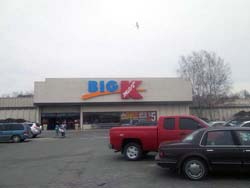 that I needed direction. Although I didn't know that at the time, I did know that I needed work. Not just any work mind you, but work with a future; something that would provide training and give me that direction I didn't know I needed at the time. I guess instinct was guiding me toward a career. I had just recently obtained my GED, but that didn't seem to mean much to anyone at the employment office. In 1971/72 job training wasn't as prevalent as it is today. that I needed direction. Although I didn't know that at the time, I did know that I needed work. Not just any work mind you, but work with a future; something that would provide training and give me that direction I didn't know I needed at the time. I guess instinct was guiding me toward a career. I had just recently obtained my GED, but that didn't seem to mean much to anyone at the employment office. In 1971/72 job training wasn't as prevalent as it is today.
In any case, I was barely 18 years old with a wife and a child so to survive I had to apply for public assistance. At that time the case worker informed me that if I didn't find employment within a specified period of time, I would have to work for the city's sanitation department. Yup...! I was going to be a "Mon-Back." You know what a Mon-Back is; don't you? That's the guy who stands behind the garbage truck waves and yells "Mon Back." Well, the thought of such a dead-end position scared the hell out of me. So I thanked the case worker for the assistance, left the office and headed straight for the Air Force recruiter's office. That is what influenced my decision to join the military. for the assistance, left the office and headed straight for the Air Force recruiter's office. That is what influenced my decision to join the military.
Oh yes, as a side bar, I remember that the draft was still in full force at the time and I didn't care to find out what my lottery number was going to be. I also remember that the lottery was drawn while I was in basic training; I never did learn what my number was. I wonder if there is a way to research back to January/February of 72 to find out.
Post Script: Google is a wonderful thing. I searched "1972 Draft Lottery" and found my number to be 131 for my birth date. The lottery was held February 2nd.
WHETHER YOU WERE IN THE SERVICE FOR SEVERAL YEARS OR AS A CAREER, PLEASE DESCRIBE THE DIRECTION OR PATH YOU TOOK. WHAT WAS YOUR REASON FOR LEAVING?
While only 20 active years for retirement purposes, my career was far from brief. January 17, 1972 I entered basic training at Lackland AFB TX, and in March I was at Sheppard Tech Training Center in Wichita Falls, TX for Aircraft Maintenance Training. July of that year I arrived at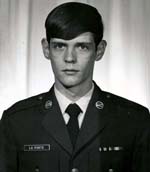 Pease AFB Portsmouth, NH where I worked FB-111A aircraft. Pease AFB Portsmouth, NH where I worked FB-111A aircraft.
Toward the end of that tour I decided I wanted to get my Federal Aviation Administration (FAA) Airframe and Power Plant (A&P) License. So in December 1975 I took a 56-day early out to begin school at East Coast Aero Tech, in Lexington, MA. This began a two and a half year break in service for me, during which I joined the Massachusetts Air National Guard at Otis AFB on Cape Cod in February 1976, where I worked F-106's for a short time. I say for a short time because after I finished A&P School in July of 77, I took a job with Lear Siegler (Management Services Division) where I started to work depot level maintenance on T38 aircraft at Holliman AFB in Alamogordo, NM. I was involved in many projects there, but the most memorable was converting T-38's into Thunderbirds; I still know how that smoke system works.
After about a year here I was becoming disillusioned with the whole thing. They hired me because I held an A&P license, but I had yet to work under the certificate. Additionally, there were guys separating and retiring being hired without an A&P making the same money I was. I was a bit envious of the retirees who were collecting retirement as well as a pay check, so in August of 78 I decided to put my civilian profession on hold to restart my military career.
I was fortunate enough to be accepted back into the Air Force as an A1C where I was assigned to Plattsburgh AFB, NY performing the same crew chief duties on the same type of aircraft as I did in my first assignment.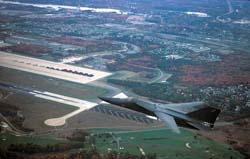 After approximately two years I made Staff Sergeant and was accepted as an instructor with the Field Training Detachment. I went back to Sheppard for Technical Instructor Training in 1980 and taught FB-111A maintenance practices to fledgling mechanics for two years; during which time, I also received a line number Technical Sergeant (TSgt). After approximately two years I made Staff Sergeant and was accepted as an instructor with the Field Training Detachment. I went back to Sheppard for Technical Instructor Training in 1980 and taught FB-111A maintenance practices to fledgling mechanics for two years; during which time, I also received a line number Technical Sergeant (TSgt).
In 1982, I was offered a three-year assignment to Kadena AB Japan to teach F-15A/B/C/D aircraft maintenance. Toward the end of this assignment, I really wanted to get back on F-111s; in particular FBs at Pease. Unable to get a slot at Pease, I volunteered for a consecutive overseas tour (for Field Training) to RAF Lakenheath, UK where I taught F-111Fs for three years and was promoted to Master Sergeant as well. In November 1988 I hoped to get back to Pease AFB NH but was reassigned to Mountain Home AFB Idaho instead. I worked as an expediter for six months when Maintenance Training Flight required a replacement NCOIC of Development and Application. Since I had eight years experience in Field Training, they felt that I was qualified to assume the position.
In 1992 I retrained into Computer Controlled Communication Systems and was assigned to the Pentagon Communications Agency upon completion of tech school. And in November 1994 I retired with 20 active years of Military Service.
IF YOU PARTICIPATED IN COMBAT, PEACEKEEPING OR HUMANITARIAN OPERATIONS, PLEASE DESCRIBE THOSE WHICH WERE THE MOST SIGNIFICANT TO YOU AND, IF LIFE-CHANGING, IN WHAT WAY.
 While I did not directly participate in any combat operations, I was stationed at RAF Lakenheath, UK when F-111s from our base took off to bomb Libya Tuesday, 15 April 15, 1986. Code-names El Dorado Canyon, the air strikes, ordered by President Ronald Reagan, were in retaliation for Libyan terrorists bombing the La Belle discothèque in West Berlin on April 5, 1986. While I did not directly participate in any combat operations, I was stationed at RAF Lakenheath, UK when F-111s from our base took off to bomb Libya Tuesday, 15 April 15, 1986. Code-names El Dorado Canyon, the air strikes, ordered by President Ronald Reagan, were in retaliation for Libyan terrorists bombing the La Belle discothèque in West Berlin on April 5, 1986.
The entertainment venue was commonly frequented by United States soldiers, and two of the dead and 79 of the injured were American servicemen. A reported 230 people were injured. Some of the victims were left permanently disabled.
The strikes were conducted by U.S. Air Force, Navy and Marine aircraft with targets in the Libyan capital of Tripoli and city of Benghazi. The strikes reportedly killed at least 15 people, including Colonel Qaddafi's daughter. One of our F-111 aircraft from RAF Lakenheath, UK was shot down, resulting in the death of two brave airmen.
FROM YOUR ENTIRE SERVICE, INCLUDING COMBAT, DESCRIBE THE PERSONAL MEMORIES WHICH HAVE IMPACTED YOU MOST?
No on e memory stands out among the rest. My military career is a collection of memories; some good and some not so good. Although I'm hard pressed to recall any that were not so good. e memory stands out among the rest. My military career is a collection of memories; some good and some not so good. Although I'm hard pressed to recall any that were not so good.
However, if one memory were to stand out, it would be when my aircraft (the airplane I crewed 68-0269) made the best bombing run during a locally generated operational exercise.
What made this so memorable is that just before the exercise the aircraft had been used as a forward supply point and we were heavily in the throes of gathering the parts and reassembling it. We managed to complete this and fly the aircraft for the exercise. As I said the results were that our efforts produced a sortie which performed above the rest. Of course it didn't hurt that we had a top notch crew in the cockpit either.
OF ALL THE MEDALS, AWARDS, QUALIFICATION BADGES OR DEVICES YOU RECEIVED, PLEASE DESCRIBE THE ONE(S) MOST MEANINGFUL TO YOU AND WHY?
I only received two commendation medals during my career; and one of them was during retirement.
However, any recognition I received (and there was sufficient) was special because supervisory individuals, and those from other organizations, recognized my contributions to the mission and took the time to publicly acknowledged them. That was more than enough for me.
WHICH INDIVIDUAL(S) FROM YOUR TIME IN THE MILITARY STAND OUT AS HAVING THE MOST POSITIVE IMPACT ON YOU AND WHY?
 That's easy. Winter 1972, Chief Master Sergeant George Fischbach (Not sure of the correct spelling). This man had my back. More importantly he had the back of any maintainer who worked for him. That's easy. Winter 1972, Chief Master Sergeant George Fischbach (Not sure of the correct spelling). This man had my back. More importantly he had the back of any maintainer who worked for him.
I was working a midnight shift as part of an aircraft servicing crew, and, well, let's just say that I, (a very young Airman) made a grave mistake while servicing an aircraft scheduled for an important mission that morning. When daylight broke there was brass all over that aircraft (and I don't mean shell casings). Ready to face the music, I started out of the maintenance vehicle to explain my screw-up to some highly irritated Colonels. As I made my way to the exit the Chief entered and pushed me back and said, "Stay here; don't leave the truck. I'll take care of it."To which he turned, pulled up his sleeves, repositioned his belly into his chest, and proceeded to 'Take Care of It'. I never heard another word on the subject again.
CAN YOU RECOUNT A PARTICULAR INCIDENT FROM YOUR SERVICE WHICH MAY OR MAY NOT HAVE BEEN FUNNY AT THE TIME, BUT STILL MAKES YOU LAUGH?
 I'll have to refer back to the paragraph above with respect to best memory. As a note to that, there was a local pool going on at the time for those who would like to predict which sortie would do the best. Well, having made the best bomb run, my aircraft and crew paid off 41:1. I'd say we beat some pretty stiff odds. And while it wasn't a laughable event, it still makes me smile. I'll have to refer back to the paragraph above with respect to best memory. As a note to that, there was a local pool going on at the time for those who would like to predict which sortie would do the best. Well, having made the best bomb run, my aircraft and crew paid off 41:1. I'd say we beat some pretty stiff odds. And while it wasn't a laughable event, it still makes me smile.
WHAT PROFESSION DID YOU FOLLOW AFTER YOUR MILITARY SERVICE AND WHAT ARE YOU DOING NOW? IF YOU ARE CURRENTLY SERVING, WHAT IS YOUR PRESENT OCCUPATIONAL SPECIALTY?
After retiring in November of 1994, I moved with my family to Vermont. Ever since I was stationed at Pease AFB NH, I always wanted to come back to the area. I always said after 20 years of living where I worked, I was finally going to work where I live. Until August of 1995, finding work was limited. The local employment agencies didn't have a clue as to how to laterally apply my qualifications. live. Until August of 1995, finding work was limited. The local employment agencies didn't have a clue as to how to laterally apply my qualifications.
In April of 1995 I landed a part time position with a fixed base operator in West Lebanon NH.; Mostly transient work, parking and fueling private aircraft, and schlepping fuel to the small scheduled airlines.
In August I secured a full time position with Cannon Industries in Claremont NH. The company manufactures underground mining machinery in the form of rock drills and roof bolters. They hired me to train their customer's maintenance personnel how to maintain the equipment. After a few months of self-qualification, and tech writing, I traveled coast-to-coast and into Canada doing just what I was hired for. I did this for until November of 2003.
In December of that year I took a job with the 56th Maintenance Training Flight, Luke AFB, NH. I was hired by then CMSgt. Berning; now retired and a member on this AF TWS community. I am currently serving as an instructional systems developer for F-16 maintenance training. I also teach a maintenance instructor course for incoming instructors.
 In 1996 my wife and I separated and she and our two children moved to the Atlanta area. In 1999 I met my fiancé Michele Wilcox and together we started our own DJ/Karaoke hosting service in 2001. We then moved to the Phoenix area arriving on New Year's Eve 2003/2004. I later lost her to cancer on December 5, 2005 (You may find a memorial page on my website at www.estarevents.com). I continue to operate the hosting service part-time with the assistance of my new wife Michele (formerly Petro). And through our website I also promote my talents as singer who emulates Neil diamond www.estarevents.com. At the following URL you can get a sample of my work: http://www.youtube.com/watch?v=IMnD_vshAQ4 In 1996 my wife and I separated and she and our two children moved to the Atlanta area. In 1999 I met my fiancé Michele Wilcox and together we started our own DJ/Karaoke hosting service in 2001. We then moved to the Phoenix area arriving on New Year's Eve 2003/2004. I later lost her to cancer on December 5, 2005 (You may find a memorial page on my website at www.estarevents.com). I continue to operate the hosting service part-time with the assistance of my new wife Michele (formerly Petro). And through our website I also promote my talents as singer who emulates Neil diamond www.estarevents.com. At the following URL you can get a sample of my work: http://www.youtube.com/watch?v=IMnD_vshAQ4
WHAT MILITARY ASSOCIATIONS ARE YOU A MEMBER OF, IF ANY? WHAT SPECIFIC BENEFITS DO YOU DERIVE FROM YOUR MEMBERSHIPS?
American Legion, Post 105, Phoenix, AZ and Air Force Sergeants Association (AFSA), chapter 1260, Luke AFB, AZ.
While I am a non-participating Lifetime Member of the AFSA, I do frequent the AL post and other Phoenix area posts where I find the camaraderie somehow comforting. Regardless of our individual service experience, not a word has to be said, we all recognize our commonality.
IN WHAT WAYS HAS SERVING IN THE MILITARY INFLUENCED THE WAY YOU HAVE APPROACHED YOUR LIFE AND YOUR CAREER?
 Attention to Detail. I've always been an observer (not a voyeur, an observer, cheesh!) By that I mean that I've always been aware of my surroundings. At the same time I have been somewhat surprised by just how many people don't pay attention; to anything! The attention to detail of which I speak is a sense I developed and honed thanks to the military. I find this has served me well in life, and should continue to do so; at least until the Alzheimer's takes full control. Attention to Detail. I've always been an observer (not a voyeur, an observer, cheesh!) By that I mean that I've always been aware of my surroundings. At the same time I have been somewhat surprised by just how many people don't pay attention; to anything! The attention to detail of which I speak is a sense I developed and honed thanks to the military. I find this has served me well in life, and should continue to do so; at least until the Alzheimer's takes full control.
BASED ON YOUR OWN EXPERIENCES, WHAT ADVICE WOULD YOU GIVE TO THOSE WHO HAVE RECENTLY JOINED THE AIR FORCE?
Enjoy it while you can. Think of the military as your extended family. As we all look back, we may find there are things we may have done differently given another chance. As for me, it's true as well.
There are some, who when it comes to the topic of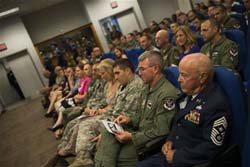 retirement ceremonies, do not wish to have one; myself included. And because I thought along those lines I opted out. And I'm here to tell you I was wrong to do so. retirement ceremonies, do not wish to have one; myself included. And because I thought along those lines I opted out. And I'm here to tell you I was wrong to do so.
While I was active, I attended a total of one retirement ceremony. Since I've been working here at Luke, I've been to ceremonies for supervisors, friends, coworkers, counterparts and over the past seven years there have been more than I can count. Over this time I have come to realize one thing the family I speak of cares for you. I see it, and feel it in every ceremony I attend. And I now regret not allowing one to be held on my behalf.
You may not understand, you may not agree, but as I see it, to decline a retirement ceremony is to insult that family member who has stood by your side all those years you served.
 When I was approached on the subject I said all I wanted when I left was one less thing than I got when I entered military service; that was the psychological kick in the pants to get me motivated. I thought, hell, nobody gave me a party when I came in, why should there be fanfare when I Leave? As I see it now someone should have given me a kick in the pants to wake me up to the idea that the retirement ceremony is not just about me. It's about the relationship between the service member and the service. When I was approached on the subject I said all I wanted when I left was one less thing than I got when I entered military service; that was the psychological kick in the pants to get me motivated. I thought, hell, nobody gave me a party when I came in, why should there be fanfare when I Leave? As I see it now someone should have given me a kick in the pants to wake me up to the idea that the retirement ceremony is not just about me. It's about the relationship between the service member and the service.
Think about it. When you left for the service, wasn't there a loved one who saw you off? Who you said goodbye to? Well that's the idea of the ceremony. It's an opportunity for family members to recognize, and say goodbye to each other.
So for those who don't think they deserve, are too embarrassed, or can't be bothered, to have a ceremony I say think again. Give that family member the respect it deserves and honor your family as your family honors you for your accomplishment and the time you spent together.
This is the advice I would give.
IN WHAT WAYS HAS TOGETHERWESERVED.COM HELPED YOU REMEMBER YOUR MILITARY SERVICE AND THE FRIENDS YOU SERVED WITH.
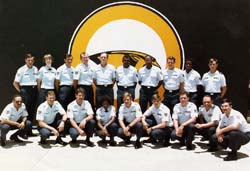 Having been a member since 2010, I have had contact with a few fellow service members. I have also meet new friends since signing on. And I look forward to doing more so as time goes on. Having been a member since 2010, I have had contact with a few fellow service members. I have also meet new friends since signing on. And I look forward to doing more so as time goes on.
|


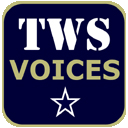
Read Other Interviews in the TWS Voices Archive
| Share this Voices Edition on:


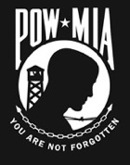  |
|
TWS VOICES
TWS Voices are the personal stories of men and women who served in the US Military and convey how serving their Country has made a positive impact on their lives. If you would like to participate in a future edition of Voices, or know someone who might be interested, please contact TWS Voices HERE.
This edition of Air Force Voices was supported by:
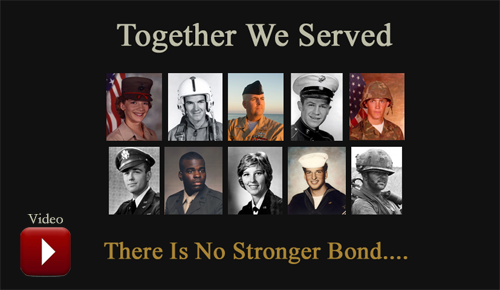
AirForce.Togetherweserved.com
For current and former serving Members of the United States Air Force, Army Air Corps, Air Force Reserve and Air National Guard TogetherWeServed is a unique, feature-rich resource helping Airmen reconnect with lost Wingmen, share memories and tell their Air Force story.
To join AirForce.Togetherweserved.com, please click HERE.
|
|